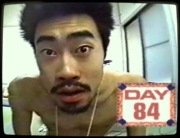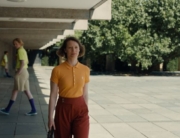What’s with middle-aged French actresses? Carole Bouquet, in Andre Téchiné’s Unforgivable, joins the likes of Nathalie Baye, Sabine Azema, and Catherine Deneuve, ageless wonders who look more elegant and enticing by the year. Bouquet could still plausibly play one of her most famous roles as a gorgeous wife whose husband dumps her for a frumpy secretary in Bertrand Blier’s 1989 comedy Too Beautiful for You.
In Unforgivable—another Téchiné film played out among several characters whose interlocking stories dramatize life’s unavoidable messiness—Bouquet has the meatiest part. She’s Judith, a bisexual model-turned-antique dealer-turned-real estate broker whose unapologetic past becomes the obsessive focus of her current husband, the older crime novelist Francis (Andre Dussollier), whom she marries shortly after showing him a house on an idyllic island near Venice, where they currently live.
The couple’s seemingly perfect relationship, however, is too good to be true for Francis, even after only a year and a half of being married. Stymied, he can’t even begin to write his new novel. Soon after Francis’s flighty adult daughter, Alice (Melanie Thierry), visits the couple, she mysteriously disappears, leaving her 10-year-old daughter with him and Judith. He hires Judith’s close friend (and former lover) Anna Maria (Adriana Asti)—a retired private detective—to track Alice down. And later, he pays Anna Maria’s fresh-out-of-jail son, Jérémie (Mauro Conte), to tail Judith to find out if she is having an affair. As a result, Francis finds out more than he wants to know about his married daughter—who has run away with a drug dealing lover—and about his wife. The fallout from these revelations—which also includes a suicide attempt—causes Francis to reexamine how he’s behaved in his marriage.
Téchiné’s films explore society’s moral compass through a cross-section of characters, and sometimes his characterizations collapse under the weight of his themes, like in the unsatisfactory AIDS melodrama The Witnesses. But in Unforgivable—as in his best films My Favorite Season and Strayed—Téchiné’s technique subtly serves the relationships, that are as complex and involving as any in modern cinema.
There’s a lot going on in Unforgivable, sometimes too much. Téchiné strains for significance by nicknaming Judith Cherubina, an allusion to the delightfully rakish Cherubino in Mozart’s opera The Marriage of Figaro, or when Judith’s nose bleeds occur right before she begins a romantic relationship. Contrivance too often shapes these people’s lives: Judith even has had some sort of relationship with the rogue who’s run with her daughter-in-law. But Téchiné’s masterly direction—subtly elliptical editing that compresses long periods of time, camerawork that evocatively fades to white during moments of emotional intensity, and the effectively sparing use of Max Richter’s chamber music—makes the script’s symbolism and coincidence feel organic and natural. These people’s lives become convincingly messy, not merely contrived movements by an auteur’s puppets.
In addition to Bouquet’s perfectly pitched performance (in which she speaks French, Italian, and English), the wonderful Andre Dussollier makes Francis a believable bundle of contradictions, and together they transform a potentially cutesy ending into something powerfully consistent with the rest of Téchiné’s film, in which shattered relationships can be rebuilt, piece by broken piece.





